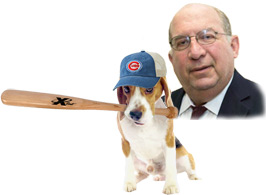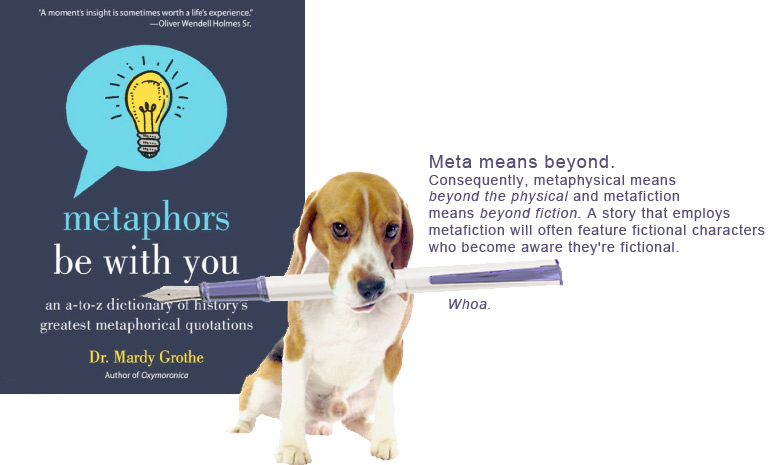We encounter “meta” most often in the word metaphor.
We create metaphors when we see the same pattern in two, unrelated things.
Shakespeare wrote, “All the world’s a stage, and all the men and women merely players. They have their exits and their entrances, and one man in his time plays many parts.”
But Shakespeare wasn’t the first to see the similarity between the world and a stage. Seneca the Younger – sixteen hundred years before Shakespeare – wrote, “Life is like a play: it’s not the length, but the excellence of the acting that matters.”
In his marvelous new book, Metaphors Be With You, Dr. Mardy Grothe reveals the importance of metaphors in everyday communication:
“Metaphor is the energy charge that leaps between images, revealing their connections.”
– Robin Morgan
“Effective metaphor does more than shed light on the two things being compared. It actually brings to the mind’s eye something that has never before been seen.”
–Rebecca McClanahan
The poet Robert Frost said, “An idea is a feat of association, and the height of it is a good metaphor.”
“Metaphor isn’t just for poets; it’s in ordinary language and is the principal way we have of conceptualizing abstract concepts like life, death, and time.”
– More Than Cool Reason, George Lakoff and Mark Turner
“Meta” has recently evolved a second meaning.
It now refers to things that are self-referential. Ben Zimmer tells of a librarian named Lauren Dodd who recently tweeted, “Just saw a librarian shush other librarians at a library conference.”
(Indy Beagle is chuckling his signature, “Heh, heh, heh,” after reading that over my shoulder.)
Educational psychologist Jerome Bruner talks about “how to get students to reflect, to turn around on themselves, to go ‘meta,’ to think about their ways of thinking.”
Yep, “to think about your ways of thinking” would definitely qualify as self-referential.
In his book, Tilting Cervantes, my friend Bruce Burningham says,
“We delight in the notion of a stand-up comedian named Jerry Seinfeld who creates a sitcom on NBC in which he plays a stand-up comedian named Jerry Seinfeld who eventually creates a sitcom on NBC in which he plays a stand-up comedian named Jerry Seinfeld.”
If triple-meta were a recognized designation, I believe Bruce Burningham’s sentence would qualify.
To understand a thing that is new and different, you need only search for what it is like.
Monkfish is the poor man’s lobster.
Success is a bastard with many fathers, but failure is an orphan.
America is a melting pot.
You are my sunshine.
He drowned in a sea of grief.
Every new concept, invention, innovation or idea reflects an established pattern.
That pattern has just never been used in this application before.
Contemplate a metaphor. See the pattern. Consider how it might be used as a solution to your problem. Do this again and again and your spinning brain will soon be flinging ideas like a grinding wheel throwing sparks at the darkness.
Perhaps you’ll discover a miraculous solution. Perhaps you’ll just have fun.
Give it a try and see.
As Indy walked away just now, he called to me over his shoulder, “Anything you can do, I can do meta.”
I’m going to have to ponder that one awhile.
Roy H. Williams

Just One Before I Die: A Cub’s Fan’s Chronicle of a Championship Season, is the new book by master storyteller, Phil Revzin. A Chicago native, Phil has been Editor and Publisher of The Wall Street Journal Europe; a senior editor at St. Martin’s Press; and Editor at Large for Bloomberg News. Listen, laugh and learn as he shares piercing insights on how you can publish your own “instant” book. Along the way, he’ll share some business lessons he learned from the Cubs’ World Series win, but mostly he’ll prove that good storytelling – and good writing – will always bring delight. Phil will get started as soon as you arrive at MondayMorningRadio.com
